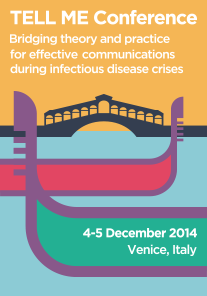Project summary
TELL ME is a 36 month Collaborative Project, which aims to provide evidence and to develop models for improved risk communication during infectious disease crises. TELL ME combines public health, social sciences, behavioral sciences, political sciences, law, ethics, communication and media, in order to develop original communication strategies regarding complicated messages and advice based on uncertainties, also addressing vaccine-resistant groups.
The changing paradigms of public communication during infectious outbreaks
During infection outbreaks, one of the major problems has always been to communicate with the population in order to influence behaviors, reduce the spread of disease and avoid panic. For centuries the communication strategy adopted by authorities dealing with infectious outbreaks was chiefly based on denial and verbal reassurances, followed, in a further phase, by restrictive measures (quarantine, isolation, compulsory hospitalization) and sanctions for non compliant individuals. The increasing recognition that human behaviour critically influences infectious disease transmission led to concentrate efforts on education and prescriptive messages.
Yet recommendations were soon recognized as insufficient, people needed to be also “persuaded” by emotional messages. The focus then shifted on public health propaganda. As the rapid and tumultuous progress in biological sciences, computer sciences, information technologies, and the naissance of a global public health governance, are offering new, surprising, opportunities for the containment of infectious disease outbreaks, there is the danger that we fail to take advantage of these opportunities, only getting their “adverse effects”. We need instead to understand how maximizing opportunities and minimizing risks, notably we should learn to exploit the huge potential that the info society may offer in terms of evidence based and participatory communication. This is the first lesson, that one should get from communication failures occurred during the 2009 influenza H1N1 pandemic. A real paradigm shift has occurred, new challenges must be addressed, new models should be developed: this is the pivotal concept that has driven the consortium to propose the TELL ME project.
Research Questions
TELL ME will answer three distinct research questions.
- How can the general population be persuaded through public health communication to take effective preventative actions (e.g., vaccination, antiviral therapy, hygienic norms, etc.)?
- What are the most appropriate communication methods to deal with complexity, uncertainty, ignorance, information asymmetries, overwhelming information, biased information, misinformation and malicious information?
- What are the best communication strategies to support vaccine uptake, and to assist health professionals and agencies to engage with vaccine-resistant groups?
The objectives of TELL ME project
TELL ME sets one over-arching goal, which is the establishment of an integrated research project involving social sciences, behavioural sciences, communication, media expertise and civil society to develop an evidence- based behavioural and communication package to respond to major epidemic outbreaks. In order to reach this goal, TELL ME will met a number of objectives:
Table. List of Objectives
| OBJECTIVES | Description | Topic |
|---|---|---|
| POPULATION BEHAVIOUR DURING EPIDEMICS" | Collecting and discussing evidence on population behaviour during infectious diseases outbreaks | Research should focus on and how human behaviour influences disease transmission, vaccine acceptance and antiviral therapy acceptance in the general population in a crisis situation. |
| NEW CHALLENGES AND NEW METHODS" | Identification of the new challenges and new methods for outbreak communication, addressing knowledge and attitudes towards vaccination | Research should focus on developing appropriate communication methods, especially regarding complicated messages and advice based on uncertainties, a changing epidemiological picture and information gaps. Attention should be paid to addressing knowledge and attitudes towards vaccination for a better understanding of the level of acceptable risk in vaccination in relation to the perceived risk of disease. |
| NEW COMMUNICATION STRATEGIES" | Development of an integrated, evidence based, communication workpackage (TELL ME Communication Kit) for outbreak communication. | The project should develop (...) strategies to support vaccine uptake with special focus on new communication strategies for health professionals/agencies to engage with vaccine- resistant groups. |
| AGENT BASED SOCIAL SIMULATION" | Design, construct and test a prototype of a computational method for simulating the actions and interactions of autonomous decision-making entities within a virtual environment during an epidemic outbreak | The project should (...) test strategies to support (...) |
| DISSEMINATION | Dissemination and policy dialogue |
TELL ME project is splitted in 6 work packages, that correspond to the main lines of research, disemination and management of the project.


